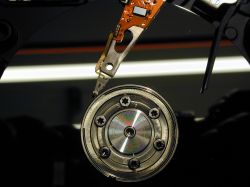- Data Recovery Home
- Data Recovery Services
- Hard Drive Recovery
- External & USB Drives
- RAID / Server Recovery
- NAS
- SSD
- SD Cards
- Mobile Phones & Tablets
- CCTV & DVR
- Macs
- Windows Computers
- Lost & Deleted Files
- Advanced Forensic Data Recovery (ADR) Services
- Password Recovery
- Forensic Investigation
- Encrypted Volumes
- Bitcoin, Crypto & NFT Wallet Recovery
- Tape Recovery
- Tape eDiscovery & Conversion
- Advanced Recovery Service
- Spare Parts & Donor Drives
- Disk Manufacturers
- SCSI Data Recovery
- SQL Recovery
- How Do Hard Drives Fail ?
- Locations
- Help & Advice
- News
- About Us / Contact
Causes of Hard Disk Drive Data Loss
Part Three – Methods of Preventing Failure and Data Corruption
The previous section highlighted the main ways in which hard disk failure and data corruption can occur. The following section details some possible preventative measures and courses of action to take with regards to hard disk failure:
- Back-Up Data – Although this will not prevent a hard disk failure, all information should be backed up to another medium so that in the event of a failure and worse case scenario of a complete data loss, the data can always be recovered from elsewhere. Back up methods can include saving to a DVD, CD, USB memory stick etc, even to another hard disk on another computer.
- Install Two Hard Disks in the Same Computer – It is possible to install two hard disks on a computer and place them under a RAID configuration. The term RAID (redundant array of independent disks) means that data can be stored or replicated among the drives so that when one drive fails, the other one works and still holds the data that may have been lost should there have been only one hard drive.
- General Maintenance – As described in the human error section, care should be taken to ensure that computers are not exposed to extreme changes in temperature, they should be kept cool and away from any dust or other contamination that could possibly get inside and cause problems. Care should always be taken when handling and moving computers to avoid any sudden knocks etc. In addition, hard disks have a limited life span, so if the hard drive is only a few years old it would be a good idea to buy a new one.

Conclusion
This essay has highlighted, first of all the need and importance of computers in today’s society and how there is an increased pressure and stress placed computers from an architectural perspective to store huge amounts of data. The advances in technology mean that the capabilities of computer hard drives are increasing both in terms of speed and storage capacity, but these technological advances cannot unfortunately eradicate the possibility for hard disk failure, which is ultimately inevitable.
The benefit is that hard disk failures can be avoided as much as possible though a good knowledge of how they work (i.e. knowing that they will need replacing after a few years of use) and taking care and caution in using them. Furthermore, the majority of hard disk failures do not automatically result in a complete data loss, often the information can be recovered by making the necessary repair or by taking quick action on the fault. Alternatively, it is not possible to completely prevent hard disk failures from occurring and in the case of severe failures such as a head crash data can be rendered completely unrecoverable. Finally, although this can result in what might be deemed as a disaster, backing up data or taking the precautions of configuring the hard drive (e.g. RAID mirror configuration) reduces the impact of the hindrance that such a failure can cause.



